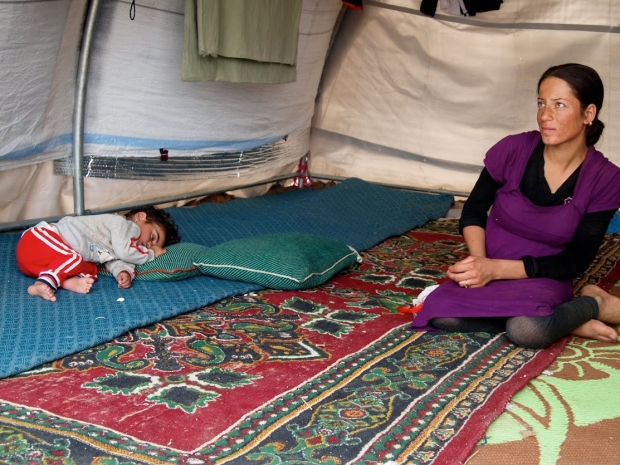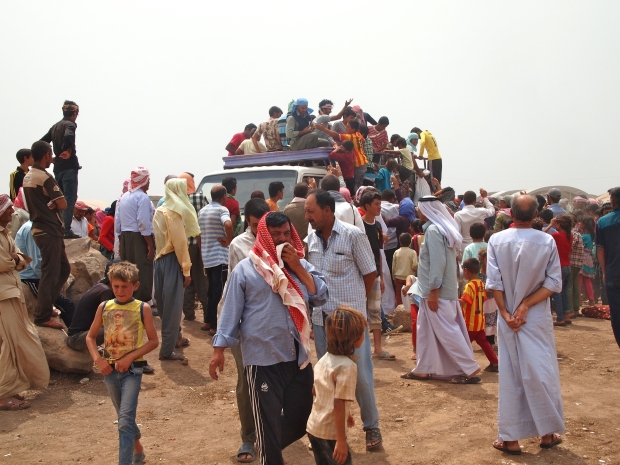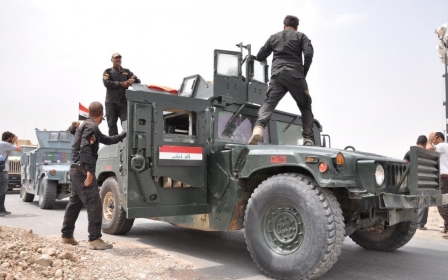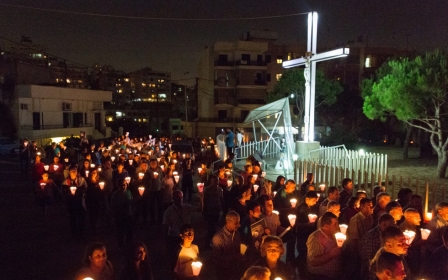Iraq's Yazidis vow to fight IS with Syrian, not Iraqi Kurds
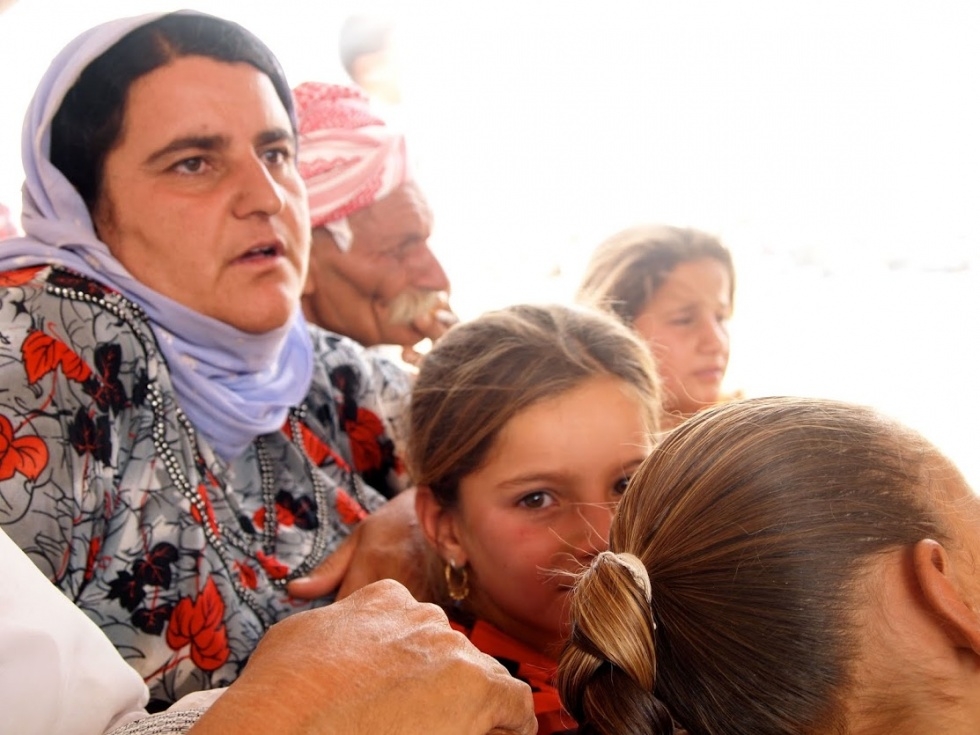
AL-MALIKIYAH, SYRIA- At the Fishkabour crossing, a tattered boat leaves behind the bright sun emblazoned on the Iraqi Kurdistan Region flag and makes its way towards Syria’s Kurdish region. On the other side, members of the Women’s Protection Unit (YPJ) and the People’s Protection Units (YPG) - the official armed wing of the Kurdish Supreme Committee of Syrian Kurdistan - guard the shore.
Approximately 60km from the border, next to the Kurdish city of al-Malikiyah (Derik in Kurdish), a desolate camp - originally set up to house Syria’s internally displaced persons - is now home to an estimated 15,000 Yazidi refugees from Iraq’s Sinjar province.
Pushed and pulled by unrelenting wind, the UNHCR tents fluttered violently. Dust has blown into the tents and into people’s belongings, under their fingernails and onto their hair. Construction is ongoing, with new latrines hastily being built to accommodate the sudden increase in refugees.
“The day before Daash (the Arabic acronym for the Islamic State) arrived, it was a day of celebrations for the Yazidis, where we celebrate the end of the heat and the start of better weather. We were home, making food for the day,” recalled 14-year old Ehtesham, a Yazidi from Sinjar.
“Then at three in the morning we heard the sound of guns,” she said.
Ehtesham’s family of seven walked for eight hours under the scorching sun. Like other Yazidis in Newroz, they climbed the Sinjar mountain range until they were found by the YPG and escorted through the perilous ‘corridor’ that would lead them to safety; a pathway where Syrian Kurdish fighters were stationed on either side, firing at IS.
The mass exodus of over 200,000 of Iraq’s estimated 600,000 Yazidis - a minority largely defined by its distinct syncretic monotheistic religion - began in early August and escalated when IS attacked their towns and villages in Sinjar. While the majority sought safety in the stable Kurdistan region, others found an improbable refuge in neighboring war-torn Syria’s secure enclave, Jazeera canton, controlled by the Democratic Autonomous Administration.
Although Ehtesham and her siblings showed resilience and even poked fun at one another, the mother admitted to their psychological scars. “My children are afraid, when there is wind and they hear the sound of the tent moving they get scared,” she said. That day, said NGO workers, had been the windiest day of the year.
The eldest daughter, 18-year old Bashima, recalled the family’s two-story home they were forced to leave. “We were so comfortable,” she said. The young girl admitted to having left behind a love-interest and had not received any news from him since.
In another tent, 52-year old Shevan also spoke nostalgically of his home in Sinjar. He wore a crisp striped shirt and spoke softly, but his bloodshot eyes fixed on the ground gave away the horrors he had endured on the mountains. “I left everything, my ID, my gold. I just put my shoes on, took the children and ran.”
"I saw Daash, they came into the town from four different sides. The Arab tribes also helped them attack us,” said the construction worker, in yet another unconfirmed account of Arab neighbors aiding the Sunni insurgents.
According to Shevan, the fault laid largely on the Peshmerga’s sudden retreat from Sinjar. In a letter to the Kurdish daily al-Ra’I al-Am President Massoud Barzani announced that security and military officials responsible for the catastrophe would be “relieved of their positions.” The Kurdish military’s retreat and the consequent humanitarian disaster, has been viewed by many as the Peshmerga’s first signs of trouble in their fight against IS since the fall of Mosul in June.
“I don’t have any faith in the Peshmerga, if I did I would have gone to Duhok [in the Kurdistan Region] instead I am here,” said Shevan, whose son recently joined the YPG alongside hundreds of Yazidi volunteers.
“We lost our honour, we lost our girls, we lost our money, we lost our houses, we lost our cars. We lost everything. Why shouldn’t we join the YPG and fight Daash?” he asked.
“They [the Yazidi] saw how YPG/J courageously rescued and saved them from brutal massacres. The rescued refugees experienced that reality, and therefore, they trust and join the YPG,” the Democratic Union Party (PYD) UK-based representative Alan Semo told Middle East Eye.
“They have lost trust in the Peshmerga that ran away instead of protecting [them],” added Semo.
Shevan’s mistrust of the Iraqi Kurdish military forces was mirrored by other refugees in the camp. A young teacher who asked not to be named was particularly adamant that the Peshmerga was to blame.
“They left us, they deceived us. If we really are the original Kurds then why did they prefer Kirkuk?” he asked in reference to the Kurds’ fierce grip on the oil-rich governorate.
While reports of low levels of ammunition and weapons among the Peshmerga suggest this may have been the reason behind the retreat, the Kurdish military spokesperson Halgurd Hikmat said that there had been no order to withdraw from any front and referred to it as “negligence”.
“The time is over, they didn’t come in the first instance, now the time is over. They have killed thousands of us,” said the teacher.
While the men and women who fled to Syria left their hometowns as IS entered them, those who escaped prior to the violent attack found refuge in Erbil and were supportive of the Kurdistan Regional Government and its efforts to protect the minority group.
In the Kurdish capital, 60-year old Salim Rashid Elias praised the Kurdish government for providing the Yazidi community with a safe haven. “We thank the Kurdistan Region and Massoud Barzani,” he said.
Firaz, a young Yazidi who recently reached Erbil from Bashiqa, north of Mosul, said he had left with help from the Peshmerga two days before the arrival of IS. There appeared to be fragmentation between those who had been rescued by the Peshmerga and those who had not.
The perils that the latter had faced were visible on their tired faces and the scars that had resulted from excessive exposure to the sun.
“When they arrived they were exhausted, sick and traumatized and very dehydrated,” International Rescue Committee’s (IRC) Humanitarian Coordinator for Cross Border Programs Blake Dawgert told Middle East Eye.
In the medical tent where IRC and the Kurdish Red Crescent work together to provide medical care for refugees, a small child laid crying as a doctor hooked him up to an IV to rehydrate him.
“One of the things we want in going forward is to work on the trauma of the population here. They’ve suffered a lot of loss, they’ve suffered a lot of fear and violence,” explained Dawgert.
IRC and community leaders are also working to create safe spaces for unaccompanied minors and find their family members. “There is one child, a disabled child in Derik hospital who has no family whatsoever. He’s now in the care of the hospital and we’re trying to find information about the family,” she said in reference to a case that made international headlines last week.
Mother of three Ghazal Qasam, 32, said she had witnessed babies dying in the mountains, “the mothers had no milk left to feed them,” she said. While her three children had all survived, she had also lost family members, forced to leave the elderly behind.
“For seven days we walked to find a safe road to cross the mountains. Our shoes were worn out. We walked it without the shoes. We arrived here and the people helped, they were welcoming,” said Ghazal.
That morning a truckload of donations from the local community in al-Malikiyah stopped amidst the battered tents, attracting a large group of people, desperate for more aid.
“Despite their own difficult situation, they [the locals] open their land, they open their houses, they open their villages,” UNHCR representative in Syria, Tarik Kurdi, told Middle East Eye.
“The villagers are in high level of poverty but still open their houses and welcome the Yazidis,” he said.
While the local community unites in solidarity with the tens of thousands of refugees who have entered Syria, many Yazidis are still hopeful that one day they will return to Iraq.
“We want to go back, our cousins are there. We will find a place. We don’t have anyone here, because all the Yazidis have gone back to Iraq,” said a mother of six.
As IS continue their advance in north Iraq, showing no mercy for the numerous religious and ethnic components of the mosaic that is Iraq, the international community begins to mobilise both humanitarian and military aid. While the UNHCR has plans to airlift humanitarian aid in the near future, Germany confirmed on Wednesday that it will arm Kurdish troops.
But for the approximately one million displaced Iraqis, the mobilisation of the international community comes too late. Historical minorities, including Christians, Shabaks and Turkmen have been forced into exile, because of their faith and are unlikely to return to their home in the near future.
Yazidi construction worker, Shevan, was adamant that they had been targeted for one reason only: “Because of our religion. They came to the community and told us we should convert. I said, ‘it’s the same, I have my religion and you have yours; what difference is there between Christianity, Islam and Yezidism?’” he asked.
New MEE newsletter: Jerusalem Dispatch
Sign up to get the latest insights and analysis on Israel-Palestine, alongside Turkey Unpacked and other MEE newsletters
Middle East Eye delivers independent and unrivalled coverage and analysis of the Middle East, North Africa and beyond. To learn more about republishing this content and the associated fees, please fill out this form. More about MEE can be found here.


